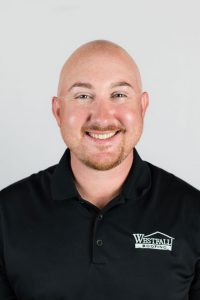An interview with Steve Sowders of Westfall Roofing
As part of its series “The Business of Climate Change,” which highlights the climate views of business men and women throughout the state, The Invading Sea spoke with Steve Sowders, sales manager of Westfall Roofing.
Here are some highlights from the interview.
Westfall Roofing is based in Tampa. How have climate change and changes in weather patterns affected the business for better or worse?
It’s affected us dramatically for better. Obviously, as a homeowner and a resident here, the climate change and the weather specifically is scary.

Us being in the roofing industry, that does help out our business. When we get the storms that we’re having and the weather that occurs here, people need new roofs. And you can tell over the last maybe decade or so, storms have become more and more frequent, but also just more and more intense.
(Referring to Hurricane Elsa)… We don’t get those until maybe later in the year, September, October, but we’re getting them earlier and earlier here in the storm season the last couple years.
What role do roofing companies play in making homes greener and more resilient?
A lot of people don’t think about roofing and energy efficiency. You think about solar, you think about windows, you think about attic insulation. And primarily roofs are asphalt shingle-based.
Asphalt isn’t necessarily an energy-efficient product but here at Westfall, we install a lot of metal roofing and metal roofing can be extremely energy-efficient.
The total solar roof reflectivity of the panels—colors have different variances, but they’re all Energy Star rated, and then a lot of times when we install a metal roof, we’ll install a radiant barrier with it, which also helps with the reflectivity and helping that homeowner save money on their electric bills.
Westfall Roofing partners with the Solar and Energy Loan Fund, a nonprofit green bank that provides financing for sustainable home improvements to low- and middle-income residents. Can you talk a little bit about that relationship?
We do a lot of work with them. They’re crucial in helping a lot of our customers get approved for a new roof that they ordinarily would not be able to afford.
And it’s just gratifying because those are the most grateful customers because whether it’s a roof that’s aged, whether it’s their insurance company forcing them to replace their roof, whatever the case is, they need a roof. They don’t have $12,000, $15,000, $20,000 sitting around and they have nowhere else to go and SELF is able to provide options for them that not a lot of people are able to do.
From your point of view, how well is the increasing demand for financing these improvements being met?
There’s not a lot of options like SELF out there, I’ll tell you that. There’s a lot of financing companies in the home-improvement industry, but they all have pretty similar restrictions and guidelines where SELF is able to give options to homeowners when they’re getting declined everywhere else.
So, yeah, to answer your question, there’s a lot of financing options out there but there’s just not a lot of options like SELF.
If a low-income homeowner needs help covering the cost of a new roof or other improvement, what should their first step be?
You can’t go down the finance route until you know what the roof’s going to cost. At the end of the day, you have to pick a contractor you trust to do the work on your home.
Obviously, money plays a part, but you want to make sure you pick the right company or contractor to do the work also. It just comes down to getting an estimate first. Estimates are free. So whether you’re looking for financing or not, get that free estimate so you have a starting point.
Kevin Mims, a Florida-based freelance journalist, is the producer of “The Business of Climate Change.” He conducted this interview with Mr. Sowders.
“The Invading Sea” is the opinion arm of the Florida Climate Reporting Network, a collaborative of news organizations across the state.



